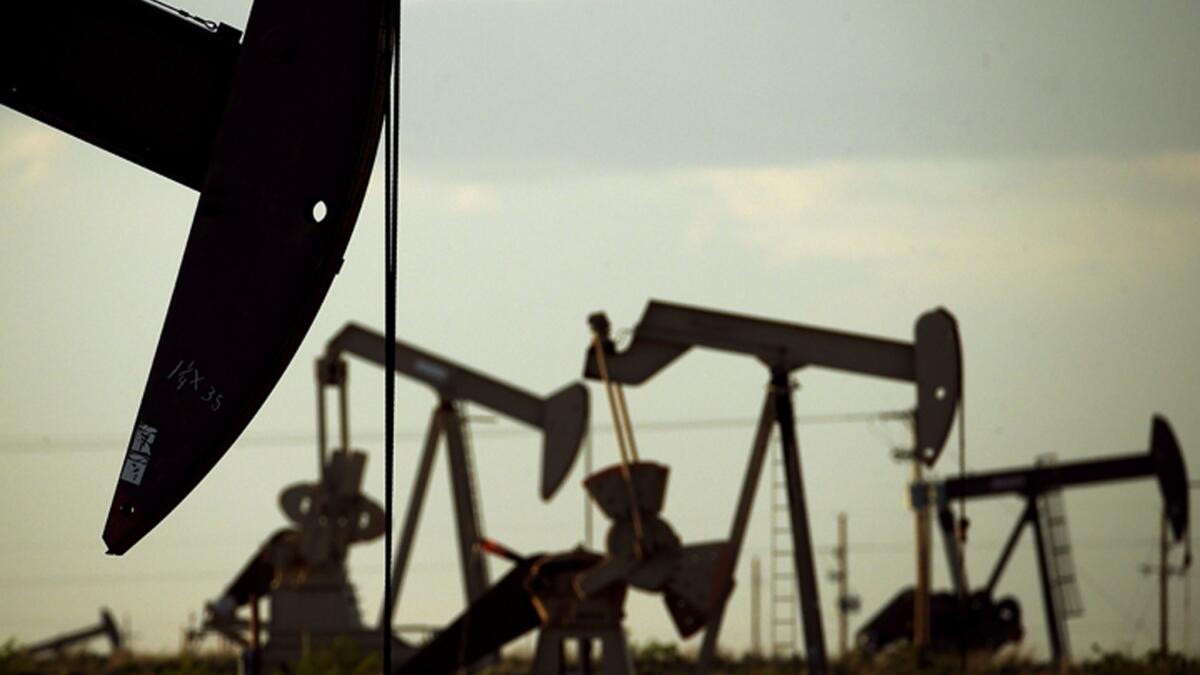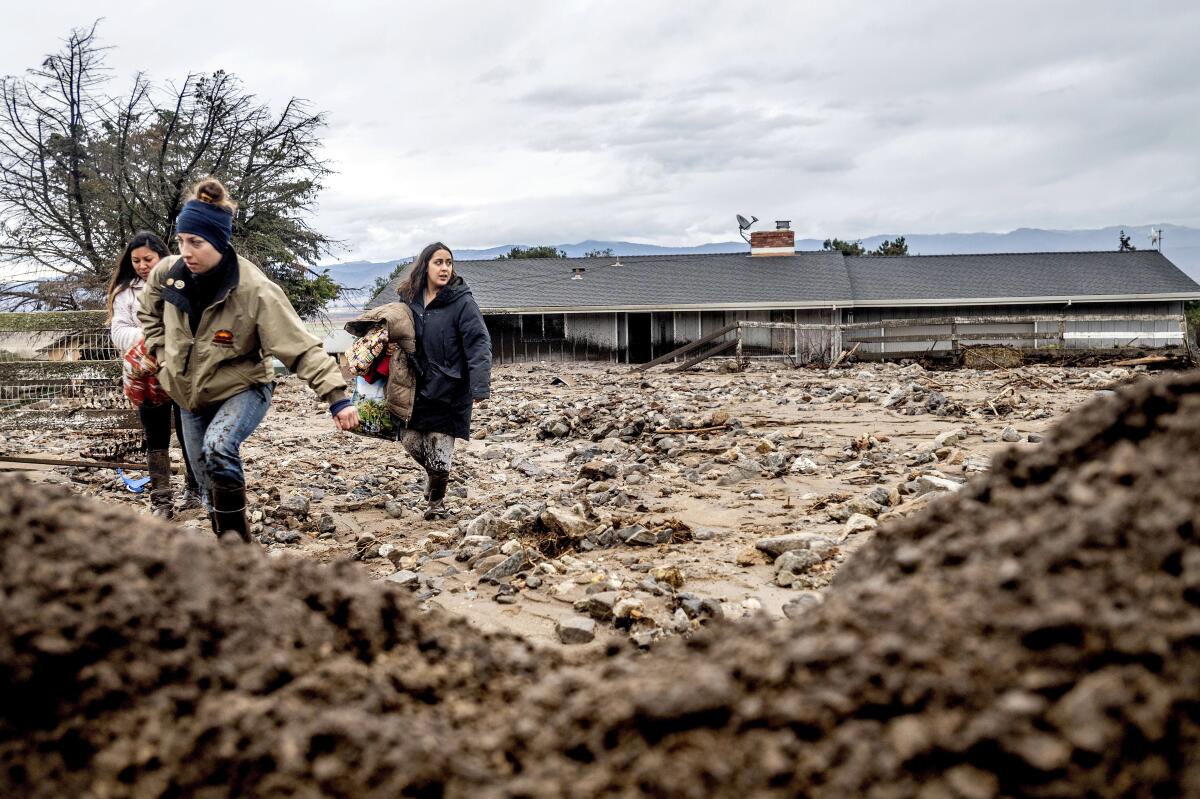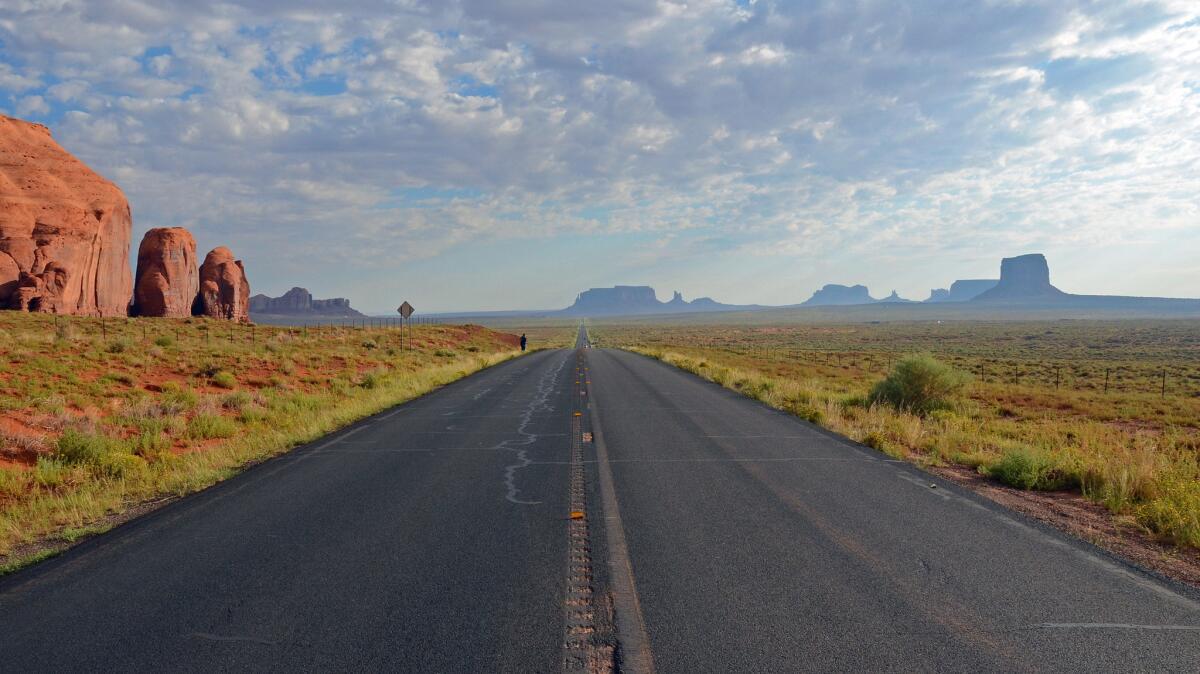Oil and gas companies say they support climate action. Are they serious?

This is the Jan. 28, 2021, edition of Boiling Point, a weekly newsletter about climate change and the environment in California and the American West. Sign up here to get it in your inbox.
The day before President Joe Biden took office, the U.S. Chamber of Commerce — one of the country’s most influential business groups, and a longtime opponent of aggressive climate policies — made a seemingly major announcement: It would support a market-based approach to slashing emissions. American climate policy, the Chamber said, “should recognize the urgent need for action.”
But three days later — as the Biden administration prepared to pause new oil and gas leases on public lands and waters — the group released a statement reading, in part, “There is never a good time to disrupt domestic energy production.”
Which left me wondering: What does urgent climate action look like, if it doesn’t include phasing down fossil fuel production?
Or to frame the question more broadly: What does it mean when oil and gas companies, and allied business groups like the U.S. Chamber, say they want to work with the Biden administration on climate change?
A major executive order signed by the president on Wednesday offered a fascinating window into what’s unfolding.
Toward a more sustainable California
Get Boiling Point, our newsletter exploring climate change, energy and the environment, and become part of the conversation — and the solution.
You may occasionally receive promotional content from the Los Angeles Times.
Let’s start with Biden’s executive order. As my colleagues Anna M. Phillips and Evan Halper report, it directs federal agencies to end fossil fuel subsidies, prioritize environmental justice and purchase zero-emission vehicles. It declares climate change a national security priority, sets a target of protecting 30% of U.S. lands and coastal waters by 2030, and calls for the creation of a Civilian Climate Corps that will put people to work restoring forests, building trails and making farming more climate-friendly.
“We’ve already waited too long to deal with this climate crisis,” Biden said at a signing ceremony. “We can’t wait any longer.”
For California and the West, the most consequential piece of the order might be Biden directing the Interior Department — which oversees more than 450 million acres of public lands — to stop issuing new oil and gas leases, at least for now.
Keeping fossil fuels in the ground on public lands was a key Biden campaign promise, even as he refused to support a national ban on the drilling technique known as fracking. About one-quarter of the country’s planet-warming carbon emissions come from coal, oil and gas extracted on federal lands, and climate advocates have long argued it makes no sense for the U.S. government to keep selling fossil fuels as the climate crisis worsens.
Fossil fuel companies have a different story to tell about climate and public lands.

On media calls hosted by the U.S. Chamber and the American Petroleum Institute this week, business leaders offered three main arguments against Biden’s moratorium on new oil and gas leases. Let’s go through them one by one, with context.
The first argument deals with economic impacts. Oil and gas industry representatives warned of tens of thousands of job losses, billions of dollars in vanished funding for schools and hospitals, and devastation for small businesses in rural towns.
“This year, New Mexico’s state budget is expected to be $7.3 billion. Thirty-nine percent of that is funded directly from oil and gas revenue,” said Rob Black, president of the New Mexico Chamber of Commerce. “It’s funding our education system. It’s funding our public healthcare system during a pandemic. And it is essential for us to be able to balance the budget.”
The potential for economic harm is real. But fossil fuel advocates leave out several key points.
For one thing, Biden’s order doesn’t touch existing leases, meaning oil and gas extraction is poised to continue on public lands for decades. And as the Associated Press reported earlier this month, the Trump administration sold more oil and gas leases than ever during its final months in power, giving companies an opportunity to stockpile drilling rights that will likely last for years.
Fossil fuel proponents also ignore the potential for renewable energy to replace at least some of the lost economic activity.
A report released this week by the Rocky Mountain Institute, a Colorado-based think tank, estimates that wind and solar farms could generate nearly $11 billion in annual benefits for rural areas nationwide over the next decade. Biden has pledged to create millions of good-paying clean energy jobs, and his executive order includes a commitment to invest in fossil fuel communities.
Fossil fuel supporters also argued that ending federal oil and gas leasing isn’t an effective strategy for fighting climate change because production will simply shift to private lands, and to countries such as Russia and Saudi Arabia.
“If we don’t continue to produce oil and gas in the United States, Americans are still going to demand access to these kinds of products. They’re still going to demand energy from oil and gas,” American Petroleum Institute President Mike Sommers said.
Again, the reality is more complicated.
I called Brian Prest, an economist who works for the think tank Resources for the Future and wrote a working paper last year examining the possible impacts of a federal leasing moratorium. While some fossil fuel production would, in fact, move to private lands and overseas, there would still be a significant climate benefit, Prest found. That’s because there would be a small uptick in oil and gas prices, and it would prompt at least some individuals and companies to seek out cheaper, cleaner energy options.
“Some of the impact of a higher price is to reduce total consumption,” he told me.
A related point: The fossil fuel industry’s arguments assume that demand for oil and gas will stay the same or possibly rise, even as Biden and state and local officials adopt policies to shift the country from oil-fueled cars to electric vehicles, from gas-fired power plants to renewable resources and from gas furnaces to electric heat pumps.
I asked Sommers, from the American Petroleum Institute, if he would ever support policies meant to reduce demand for fossil fuels. He didn’t really answer, instead telling me, “The United States is blessed with an incredible supply of oil and gas. We know the world is going to continue to demand it, based on every economic model.”
And that brings us to the third and most revealing argument from oil and gas advocates: They say they’re already taking meaningful actions to fight climate change on their own, and government mandates mostly wouldn’t help.
Officials on both media calls cited improved efficiency in the use of oil and gas. They talked about the role gas has played in pushing even-more-polluting coal off the power grid, and in complementing solar power by generating electricity after sundown. And in a change of pace from the Obama and Trump years, both the U.S. Chamber and the American Petroleum Institute said they would work with the Biden administration on regulations to reduce emissions of methane, a powerful planet-warming pollutant.
What other government actions would be helpful, in the fossil fuel industry’s view? Greater support for carbon capture and storage technologies, which could offer oil and gas companies a climate lifeline if costs come way down. And some kind of market-based climate policy, details to be determined, that would encourage “innovation” — a buzzword mentioned again and again.
“We will never improve the world’s environmental protection by removing American ingenuity from domestic energy production,” said Stephen Waguespack, president of the Louisiana Assn. of Business and Industry.
And therein lies the fundamental tension: The fossil fuel industry appears unwilling to support policies that phase down or eliminate oil and gas production. They say they want to work with Biden, but their idea of climate action differs enormously from what the president campaigned on, and what scientists and activists say is necessary.
The climate future envisioned by these companies allows large amounts of fossil fuels to continue to be burned. And if that future is incompatible with cutting emissions roughly in half by 2030, and zeroing them out by 2050 — which scientists say is needed to avoid the worst consequences of climate change — I don’t expect the industry to quietly accept its own demise.
Here’s what’s happening around the West:
TOP STORIES

First the fire, then the rains. After a record-shattering fire season, The Times’ Joseph Serna and Erin B. Logan report that parts of California will face worse mudslide risk than usual as storms roll through and inundate hillsides weakened by flames. Mudslides are already happening along the Central Coast, actually. It’s also worth noting that although California’s cycle of drought and fire and flood is worsening with climate change, it’s not new; I was fascinated to learn in this piece by Paul Duginski that Woody Guthrie wrote a song about the “Los Angeles New Year’s Flood” that killed at least 45 people on Dec. 31, 1933 and Jan. 1, 1934.
Biden did so much climate stuff in his first week that it’s already hard to keep track. An early focus is setting in motion the unwinding of Trump’s regulatory rollbacks, as detailed by Inside Climate News in this excellent rundown. Biden also canceled a federal permit for the Keystone XL oil pipeline — construction of which has come to a halt — and started a process to consider restoring Bears Ears National Monument to its original size. Tribal leaders say Bears Ears should be only the beginning of Biden’s work to protect lands sacred to Native Americans, as Jessica Douglas and Graham Lee Brewer report for High Country News.
Utah Sen. Mitt Romney, by the way, said unilaterally restoring Bears Ears to its former size “will only deepen divisions in this country,” as the AP’s Brady McCombs and Patrick Whittle report. Alaska Sen. Dan Sullivan had a similar response to Biden’s order to put a freeze on new oil and gas activity in the Arctic National Wildlife Refuge, suggesting that it goes against “national unity and healing,” per Alex DeMarban at the Anchorage Daily News. The lesson appears to be that as Biden calls for unity and bipartisanship, fossil fuel supporters are likely to denounce climate policies they don’t like as inherently divisive.
POLITICAL CLIMATE
Biden’s latest executive order directs federal agencies to start buying zero-emission cars and trucks. The Atlantic’s Robinson Meyer explains just how big a deal that is, noting that the federal government owns more than 645,000 vehicles. The president will also need to get to work on charging stations; a new report finds California alone might need 1.5 million electric vehicle chargers by 2030, triple Biden’s campaign promise for the entire country, as David Ferris reports for E&E News.
It helps that clean cars have gotten a lot cheaper. New data show that electric vehicles typically save drivers money in the long run due to lower fuel costs, even with higher up-front prices, per the New York Times’ Veronica Penney. And of course, auto companies keep rolling out new electric models. On the luxury side of the market, my colleague Russ Mitchell reports that Lucid Motors is getting ready to start producing electric cars in Arizona, and that its stylish new vehicle has drawn rave reviews.
Many of Biden’s most ambitious climate plans are unlikely to get 60 votes in the Senate, the number required to beat a filibuster if the Democratic majority chooses to keep that rule in place. But it’s possible a 100% clean energy standard could be approved through budget reconciliation, which requires only a 50-vote majority. Greentech Media’s Julian Spector explains.
ENERGY IN THE WEST

Republican lawmakers in Arizona are trying to pass a bill that would block a 100% clean energy mandate tentatively approved by the state’s utilities commission in November. Here’s the story from Ryan Randazzo at the Arizona Republic, who notes that the clean energy mandate was approved by a Republican-majority utilities commission with bipartisan support.
Oregon’s first and last coal plant shut down in October. In a thoughtful piece for High Country News, Carl Segerstrom talked with half a dozen workers who helped operate the Boardman facility, giving them a chance to reflect on transitions in the energy sector and in their own lives. “We produced power for people to use and at a fair and reasonable rate. When I go down to Portland, I always feel pretty good walking around seeing all the lights, going to a soccer game,” the plant manager said.
In the Pacific Northwest, climate activists have had enormous success blocking coal and natural gas export terminals. How have they done it? Robert McClure reports in this deep dive for Investigate West, part of their Decarbonizing Cascadia series.
WATER IN THE WEST
This one weird vitamin deficiency may be killing California salmon. If you’ll forgive my clickbait intro, check out this story by The Times’ Susanne Rust about new research finding that a lack of thiamine — aka vitamin B1 — is likely killing baby salmon in a state whose treasured chinook runs have been decimated by human activity. In better aquatic news, The Times’ Jennifer Lu uses illustrations and graphics to explain how a ban on gill nets has helped harbor porpoises bounce back off the California coast.
Biden’s nominee to oversee Western water issues at the Interior Department is New Mexico water lawyer Tanya Trujillo. She previously served as executive director of the Colorado River Board of California, as Theresa Davis reports for the Albuquerque Journal. Trujillo will not have an easy job. The outlook for Colorado River water stored at Lake Powell — much of which eventually flows to Lake Mead and becomes part of Southern California’s supply — is so bleak that a drought plan is being triggered for the first time in Colorado, New Mexico, Utah and Wyoming, KUNC’s Luke Runyon reports.
Democratic Sen. Jon Tester introduced a bill to protect hundreds of miles of Montana rivers, and he hopes to win bipartisan support in an increasingly red state. Nick Ehli wrote about the Montana Headwaters Legacy Act for the Washington Post.
ONE MORE THING

Like many of you, I was moved by the poem written and recited at President Biden’s inauguration by 22-year-old Los Angeles native Amanda Gorman, the country’s first youth poet laureate.
So I was pleasantly surprised to learn that Gorman also wrote a gorgeous poem about climate change, titled, “Earthrise.” You can watch her reading it for the Climate Reality Project, an education and advocacy group founded by Al Gore.
Let’s close with an excerpt:
“Just as we chose to go to the moon
We know it’s never too soon
To choose hope.
We choose to do more than cope
With climate change
We choose to end it —
We refuse to lose.”
We’ll be back in your inbox next week. If you enjoyed this newsletter, please consider forwarding it to your friends and colleagues.
Also, last week’s newsletter referred to Wally Leimgruber as a former Imperial Irrigation District director. He is actually a former Imperial County supervisor.




